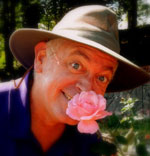
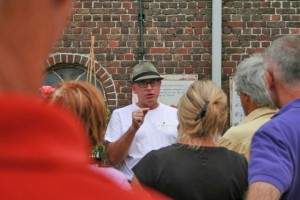
Paul Zimmerman lives a life one who loves roses and gardening can only dream of. He is owner of Paul Zimmerman roses, a company dedicated to Budding the Rose Grower In All Of Us. His credentials include a veritable who’s who in the rose world, among them Dr. Thomas Cairns, past president of both the American Rose Society and World Federation of Rose Societies, Steve Jones, former president of The American Rose Society who introduced him to Old Garden Roses, Bob Edberg of Linberlost Roses and Rose Books. He writes award-winning articles for The Rose, the National Magazine and Annual of the American Rose Society. Paul also hosts the blog “Roses Are Plants, Too” on Fine Gardening Magazine’s Web site. He lectures internationally and serves as an international juror for numerous rose trials. While attending school at UT Austin studying Aerospace Engineering he quickly realized rocket science was not for him and did the next logical thing, he enrolled in clown school, The Dell Arte School of Mime & Comedy in Northern California. He actually toured the country for 15 years doing stand-up comedy where he met his current fiance, Pam. After becoming an ABC TV show head writer for 2 years Paul decided to return to his first love, gardening and roses. Currently he and Pam live on a 27 acre horse farm in the foothills of the Blue Ridge Mountains. I had the pleasure to talk with Paul and share some of his adventures with you. Exciting news for rose lovers! Paul’s upcoming book called ‘Everyday Roses’ is being published by Taunton Press and will be available online and in bookstores across the country in Feb 2013.
Q. Paul, you mentioned you are a first generation American of Dutch parents. One cannot think of Holland without thinking of tulips. Is this part of your heritage? Tell us about yourself and how you came to love roses and be in this business.
A. While my family has always loved gardening, there is no tradition of anyone being in the horticultural industry. While we love tulips and have planted many on our farm, our main bulb planting has been over 2000 daffodil bulbs that come back year after year. My wife’s heritage is British and she loves daffodils.
- I’ve always loved gardening and in fact had a little lawn care business when I was growing up in Miami, Florida. In the early 1990s I was looking for a career change and took some time off to decide what that should be. I began gardening again and bought three roses, Pristine, Crystalline and Olympiad. After that I bought some David Austin Roses and then some Old Garden Roses. I joined a rose society and then was instrumental in creating a new one – The Tinseltown Rose Society. I was the first Vice President and later President. One day I was helping a member prune their roses when a neighbor walked up and asked me what I would charge to prune their roses. From that came my company Hundred Acre Woods Rosescaping, which grew to four employees caring for over 60 rose gardens in the Los Angeles area. I sold that company when my wife and I moved from Los Angeles to our farm in upstate South Carolina.
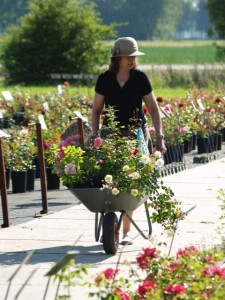
Q. As former owner of Ashdown Roses tell us how you came to be a consultant to the Biltmore Estate Rose Gardens.
A. Ashdown Roses occasionally supplied roses and advice to the Biltmore Rose Garden starting in 2002. When I closed Ashdown due to the recession and to focus on other areas of roses, is when I approached Biltmore with the idea of the Trials leading to the Biltmore Garden Rose Collection leading to the recreation of the walled rose garden. Part of my role is consultant to the rose garden.
Q. The amazing Biltmore Garden has 2000 roses with 250 varieties. Do you manage the selection process? Also do you cull out less than stellar producing varieties, etc.
A. I advise Lucas Jack, the head gardener in the rose garden, on variety selection, design ideas etc. I also help source the roses, including many new varieties just coming to market. Lucas makes the final decisions on variety selection and he is quite good at. The garden is lucky to have him.
Q. Frederick Law Olmstead, said to be the founder of American Landscape Architecture, was the landscape architect of the Biltmore gardens. Do you know if the design included the rose garden that is host to the 2000 roses of today, or was it a later addition?
A. The rose garden, in its present location and very similar configuration, was on the first drawings for the Walled Garden done in the early 1890’s and was installed with the original plantings.
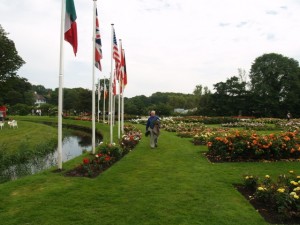
Q. The Biltmore Estate Rose Garden is host to the International Rose Trials, can you tell us about the role you play in this process.
A. I created the trials, wrote the rules, find the entrants and now run the trials with the help of the wonderful folks at Biltmore. My official title regarding the Trials is Coordinator Of The Biltmore International Rose Trials.
Q. The Biltmore Rose Garden also has a Biltmore Rose Guest Choice Award. Was this your idea?
A. I wish I could take credit but this was Parker Andes’ idea. Parker is in charge of the grounds of Biltmore. It’s a brilliant idea – particularly the text in your vote part.

Q. You recently had an extraordinary journey to The Hague International Rose Trials, a trip many rose aficionados could only dream of. Can you let us see this through your eyes?
- The Hague Trials take place in the stunning setting of Westbroekpark. Rose beds, each containing 60-80 plants of one variety are set throughout acres of green lawn. The roses are planted closely together so each bed is a massive display of roses.
- When you arrive at the trials at 11:30 AM, you are greeted by refreshments and a luncheon that takes place in a large tent. Those of us who are judging receive our judging forms and instructions, then after lunch the judging begins. We judged approximately 80 varieties of roses in a blind judging, which means we did not know their names or who the breeder was. Then we judged approximately 40 of the larger permanent beds for additional awards. The judging lasted close to two hours.
- After judging their was a break. We returned to the park at 5PM where we were greeted by champagne. At 6PM The prize ceremony began followed by a sit down dinner that lasted until 10:30 PM. It was day filled with beautiful roses, rose friends and great food and wine.
Q. You also gave talks at the Rose Nursery Bierkreek’s Rose Festival. What did you talk about?
A. I talked about purchasing roses not based on what the flower looks like but on what is the rose’s job in the garden. In other words if you need a hedge buy tall roses, if you need a low mass planting buy shorter growing roses, if you need to cover a small fence buy a moderate climber and so on. We also talked about training and pruning climbing roses.
Q. You also spent time at Jan Spek Rozen looking at new varieties. Can you give us a little preview of great things to come?
- This was my first visit to Jan Spek Rozen. I knew who they were and they had a reputation for finding new breeders in Europe with fantastic roses. I wasn’t disappointed and found some very interesting new roses. One particular breeder I did not know caught my eye and that was Martin Vissers from Belgium. Some beautiful roses and in fact one of his roses ‘Midsummer Snow’ won the Golden Rose of The Hague Trials which is the top award.
- What I’m seeing in Europe is roses with very good disease resistance, bloom shapes from Old Garden to Hybrid Tea and even fragrance. The plants are also shorter because most European gardens are quite small. Chemicals in Europe have been difficult to come by for years. Coupled with their more organic approach to everything means the roses being bred there are quite naturally healthy.
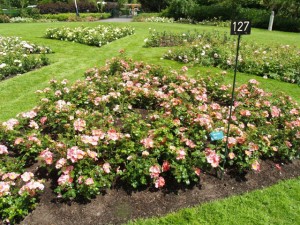
Q. You also write a blog for Fine Gardening Magazine called Roses Are Plants, Too. Can you tell us about that?
- Â The blog is weekly and I generally post a new entry on Thursdays. Fine Gardening has given me carte blanche to write anything I want about rose care, new roses or the world of roses in general. I try to make sure the majority of the articles are of the “how to” nature.
- I should also mention I’ve just written a book called “Everyday Roses. The casual gardener’s guide to growing Knockout and other modern easy care roses.” It’s being published by Taunton Press and will be out in February of 2013. It will be available at book stores, garden centers and of course Amazon, Barnes and noble.com and so on.
Q. What would you like us to know about Paul Zimmerman and your passion for roses that we don’t know?
- To me roses are just flowering shrubs and growing them should be fun and relaxing. I love finding roses that fit that description and teaching gardeners how to grow them. What one of my greatest joys is when a gardener who thought they couldn’t grow roses because of failures in the past, discovers that with the right rose and minimal organic care roses are no more difficult than most other plants.
- Â I consider myself to blessed to be able to get up each day and do something I love. As I always say, “It could be worse. I could have a job!
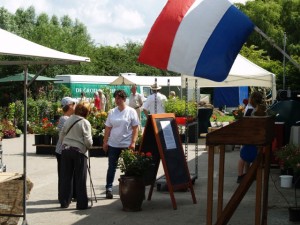
Thanks , I’ve just been looking for information approximately this topic for a while and yours is the best I have found out so far. But, what about the bottom line? Are you certain in regards to the source?|What i don’t realize is in reality how you are no longer actually a lot more well-preferred than you may be now. You are very intelligent.
Friesner,
I appreciate your comments very much. Are you looking for more information on rose growing specifically and gardening? Please let me know how I may be of further assistance. Also if you wish to have any questions answered by Paul Zimmerman I can put you in touch with him as well. Thank-you again.
Sincerely,
Susan Fox